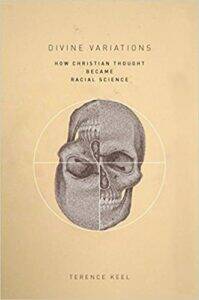Terence Keel’s Divine Variations is a striking and provocative work of intellectual archaeology. Keel’s unearthing of theological patterns of thought in modern racist modes of thinking that have conventionally been understood as secular is arresting and illuminating. The book’s argument amounts to a serious re-consideration of received accounts of the history of ostensibly ‘scientific’ racism. It is also an excellent addition to a now large body of work that has deconstructed histories of modern science and religion which stage them as essentially antagonistic and independent enterprises. Keel’s book confirms that, so very often, theological categories remained operative in modern scientific discovery and theory building.
However, unlike a good deal of work in this line, Keel’s thesis is that a (Christian) theological mindset framed and shaped forms of scientific thinking that are now widely (though sadly not universally) considered deeply suspect in ethical terms. Each of the examples that Keel uses to make his case are fascinating and important in their own right. The orchestration of these into an overarching refrain about the persistence of certain core Christian theological claims within racial science is artful and intriguing. Nevertheless, I have a number of questions and hesitations about the overall drift and frame of the argument that I will offer here for Keel to push back on.
Keel’s argument, as I read it, foregrounds the persistent influence of “Christian ideas” or “Christian intellectual history” on modern scientific theories of race. Particularly prominent are two notions, namely, the replacement and suppression of Jewish (and then cultural or ethnic) particularity by the apparent universalism of (white) Christianity and the foundational notion of a Creator determining by fiat the essential and fixed nature of created beings. While making this argument, Keel also insists that ideas about race, whether identified as theological or scientific, are culturally mediated and “historically contingent” (p. 142). Keel notes (and I agree) that the “contributions and effects” of science have been “multivalent” and cannot be approached as “permanent ideal substances” (p. 16). Yet the general inclination of his argument seems to imply that certain “Christian ideas” are stable enough, fixed and essential enough in nature, to be readily translated (or perhaps transliterated) without much change in meaning from one historical, cultural and intellectual context to another, across the centuries. With that comes a risk that we lose sight of the unstable and ‘mixed’ meanings associated with certain theological ideas, or indeed with the ways in which those meanings are shaped by their relations with other theological categories or doctrines and with very different kinds of socio-cultural contexts.
At least one of the figures that Keel draws attention to in his book provides a good example of just this point. In his chapter on American public health research in the progressive era, Keel provides an engrossing account of how the black physician Charles V. Roman mobilized the “ethical” and “Christian” (p. 111) concept of monogenism to critique the racist and ‘polygenist’ character of much public health research. Roman’s conviction that humans shared a common origin and universal nature provided him with a resource to resist biomedical research that insisted on innate bio-racial causes of the uneven impact of disease on different human populations (identified on a racial basis). Examples of others who, like Roman, drew on a Christian monogenism (and other Christian ideas) to resist racial reasoning populated the whole period that Divine Variations explores. It might be fair to ask, then, why Roman appears to stand as something of an exception to the rule in Keel’s narrative and argument? Why not emphasize to a greater degree (even if by way of a general qualification) countervailing narratives that demonstrate the ‘reoccupation’ of Christian ideas in efforts to combat the programs and pernicious effects of (purportedly) scientific racism in the modern period? This is not for a moment to deny that the stories Keel recounts must be told.There is, clearly, a disturbing and appalling history of the use of theological categories and convictions to support the worst forms of racial reasoning, scientific or otherwise. There is, clearly, a disturbing and appalling history of the use of theological categories and convictions to support the worst forms of racial reasoning, scientific or otherwise. But can it, or should it, be told without also trying to understand the existence and persistence of Christian ideas in scientific accounts used to vigorously counter racist patterns of thought?
Another related question that Keel’s book brought to mind was how, in light of the argument that it makes, we might successfully move, “beyond religious accounts of race” (p. 137)? Might a purely secular science free us from those patterns of thought that Keel argues are directly derived (at least in part) from Christian intellectual history. It would be unfair to expect Keel’s book to provide a full answer, of course. That was not its aim or purpose. But even so there are hints of possible responses. Keel generally insists, for example, that science, understood as a cultural activity, unavoidably ‘re-inhabits’ cultural patterns of thought that presumably lie beyond the epistemic limits of scientific reasoning. The question then is, what cultural patterns of thought ought to guide and frame science and why? I will return to this below. At the same time, however, Keel occasionally seems to imply that certain scientific theories, in their own (non-cultural?) terms, tell against ideas that reinforce notions of innate and stable racial differences.
One example of the latter is Charles Darwin’s theory of natural selection. In Keel’s account, Darwin’s theory points to the open-ended and undirected nature of life’s evolution and to the lack of evidence for distinctive racial traits that might permit the identification of discrete groups (or even species) of humans. That seems, on the face of it, simply a scientific description of how evolution works. Darwin’s theory also stressed, on this telling, the ‘mixed’ and fluid character of the human species and the lack of any fixed or essential nature. As such, it purportedly tells against ideas of innate and unchanging racial characteristics, of any kind of biological or natural progress towards ideal types, or of clear boundaries between groups of humans. Understood thus, it certainly appears to entirely dissolve the idea of a readily apparent and common human nature (because of a common, divinely transacted origin) and of any notion that there is, in history or in the future, an ‘ideal’ human against which all others might be measured and ranked. What is less clear, to me at least, is whether, after Darwin’s theory has done its work, we are left with a resource to counter racial science and construct something morally better in its place.
My own view is that the evidence that Darwin regarded his theory in this way is, at best, mixed and that the subsequent history of Darwinism is also ambivalent on just this question. No doubt debate will continue among Darwin scholars and historians of the reception and development of his ideas. But, touching here only on Darwin, we might mention Evelleen Richards’s view, given in her recent account of Darwin’s theory not of natural but of sexual selection, that the famous naturalist’s preferred explanation of racial differentiation relied upon and reinforced ideas of innate and inimical racial difference, thus affording them significant scientific and cultural credence.Evelleen Richards, Darwin and the Making of Sexual Selection (Chicago: University of Chicago Press, 2017). See also Gregory Radick, “Race and language in the Darwinian tradition (and what Darwin’s language-species parallels have to do with it),” Studies in History and Philosophy of Biological and Biomedical Sciences 39 (2008): 359–70. Moreover, it is not easy to see, in light of Richards’s detailed account of the intellectual sources behind Darwin’s scientific explanation of racial differences, how they drew in any substantive way on the Christian ideas that Keel foregrounds (except, perhaps, in the most displaced and remodeled form). This sits uncomfortably alongside the well-known fact that Darwin consistently opposed slavery and was anxious to demonstrate that monogenism, in the case of humans, was true (perhaps here a theological legacy in Darwin’s complex thought world is more in evidence).
Another apposite example is Thomas Henry Huxley who, as Keel shows, could not quite shake notions of progress from primitive ignoble human beginnings measured against more apparently noble instances of the human species. But Huxley’s own scientific racism Darwin consistently opposed slavery and was anxious to demonstrate that monogenism, in the case of humans, was true. was not only vaguely and inconsistently based on that lingering line of (Christian?) thought. Darwin’s famous defender proposed his own preferred racialist scheme, sometimes called ‘Huxley’s rule,’ which he believed provided an entirely natural, evolutionary and profoundly hierarchical account of racial difference. As Nicolaas Rupke has argued, racial divergence and the ranking of races into “lower” and “higher” human forms was the natural result that Huxley expected to see as human evolution unfolded.Nicolaas Rupke, “The origin of scientific racism and Huxley’s rule,” in Johann Friedrich Blumenbach: Race and Natural History, 1750–1850, eds. Nicolaas Rupke and Gerhard Lauer (Abingdon: Routledge, 2019), 233–47. What Huxley believed he had demonstrated was that the difference, measured according to brain organization and in other ways, between human (racial) groups was greater than between the “lowest” forms of humans and the “higher” apes. This view was offered precisely in order to refute any notion that humans shared a common nature that made them ontologically distinct from other hominids. Since then, of course, Huxley’s (and Darwin’s) view of the evolution and the reality of substantial racial differences has been abandoned and discredited. But the persistence of ‘race realism’ among a vocal minority who subscribe wholeheartedly to Darwinian evolution, that “blind watch (or, in their troubling view, race) maker,” suggests that evolutionary science, however much shorn of Christian habits of thought, can remain a seedbed for racial reasoning.
It might be better, then, to work with the argument Keel makes in his concluding chapter, borrowed from the Anthropologist Ashley Montagu, that “the meaning scientists attribute to human difference is a reflection of the . . . values they have internalized” (p. 142). This would point us not, first and foremost, to Darwinism or evolutionary science as a resource to overcome racist thought but to moral sources beyond its reach and remit. It is worth noting here Montagu’s own view that Darwinism, as he found it in the mid-twentieth century, was a source not for anti-racism but for a racism fueled by a Darwinian (read competitive and ruthless) form of capitalism. Though not a Christian, Montagu pointed to a biblical account of love and cooperation as a necessary counterpoint to Darwinism, and, from there, worked to reconfigure the theory of natural selection (in collaboration with, amongst others, the evolutionary biologist and Orthodox Christian Theodosius Dobzhansky) that supported an egalitarian rather than hierarchical view of human diversity (I owe this observation to an unpublished lecture by Gregory Radick).Gregory Radick, “Jesus, Darwin and Ashley Montagu,” recorded at the Faraday Institute, Cambridge University, June 11, 2013, https://www.sms.cam.ac.uk/media/1504807.
Montagu’s case suggests that those who, like him, reworked Darwin’s ideas to combat racist thought have been strongly informed, consciously or not, by certain cultural and religious concepts and ‘values’ that lay outside Darwinism’s domain. This, as well as reinforcing my earlier remarks above, points us to a more general question that arises from Keel’s concluding chapter. If indeed we cannot securely derive notions of equality and common human dignity from science as such, how might we best ensure those vital moral categories garner assent, particularly among those best placed to counter and undo the horrific effects and persistence of scientific racism? Perhaps, in light of the ‘mixed’ legacy of Christian intellectual thought, we might fruitfully turn to resources in that tradition (and, indeed, to other religious traditions not discussed here) to ‘reoccupy’ and re-work for, to borrow a biblical trope, the healing of the nations.








Comments
Be the first one to make a comment!